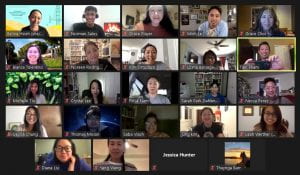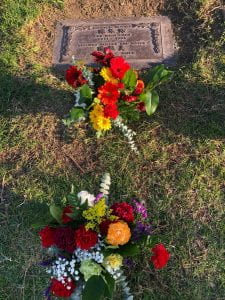
Some of the NCTE Asian American Caucus Family at Today’s Rogue Happy Hour
Community is such a powerful place to dwell.
It was a little over four years ago that a random Asian American woman approached me on an escalator in a convention center and asked if I wanted to come to a meeting of the Asian/Asian American Caucus of the National Council of Teachers of English.
There were many things going through my head at that moment. Here are a few of them:
- Who is this random woman?
- What?! There’s an Asian/Asian American caucus of NCTE? Where has this been all my life?
- Wait, what if I’m not Asian American enough for these people?
Fortunately, I went to the meeting, which was not huge (maybe 15-20 people), but was affirming. That random woman, Jung Kim, ended up becoming a close friend, running partner (although she’s way faster and has way more endurance than I do) and collaborator, my missing rage-filled, Korean American, English teacher, Oxford comma-loving sister, and someone who helped me to embrace and discover that however Asian American I felt or didn’t feel in any moment wasn’t just (or even mainly) about my own inadequacies, but about the systemic denial of affirming spaces, our own stories, and critical community for Asian Americans.
Fast forward four years and the Asian/Asian American Caucus of NCTE (#AsianAmAF) has become home and family to me. Filled with laughter and good spirited competition, memes, nerdiness and tons of love. Strengthened by solidarity and community. The caucus includes so many people that I so deeply admire and feel so proud to call friends. It brings me such joy and a sense of belonging that I hadn’t thought possible in a conference that often tops thousands of attendees.
In this moment, this space is so desperately needed.
Community Traumas, Painful Rejections, and Quiet Dismissal
It has been such a hard year, for everyone really, but since this is my blog, I wanted to take space to speak to the pain of this year through an Asian American lens.
As an Asian American of Chinese descent (although I most often identify as Taiwanese American), watching the painful racist and xenophobic rhetoric fueling a rise in discrimination and hate crimes against Asian Americans has been heartbreaking and painful. It is a reminder of how easily Asian Americans go from being the “model minority” to the “perpetual foreigner” and “yellow peril.” It is a reminder of how precarious safety and acceptance are for Asian Americans.
On top of this, having multiple Asian American-focused panels and presentations, that were first accepted by NCTE, fail to make the second round of cuts when the conference transitioned to a virtual platform, was painful. While as a caucus, it was wonderful to see many incredible panels still go forward in the program, the pain of having these presentations cut without a real understanding of why was hard.
But it was not surprising.
In co-writing our book on Asian American teachers, as Jung and I look at the stories of our participating teachers, we see time and again what was missing from their experiences: lack of Asian American teachers, lack of Asian American curriculum, lack of critical racial identity development in educational spaces.
In so many spaces this year, I have realized the ways in which Asian American voices are left out. This is not a new realization, but this year, with so much racial uprising in response to so much pain inflicted by the continued extrajudicial killing of Black people at the hands of the police, disproportionate deaths of Indigenous people and people of color at the hands of COVID, and dehumanizing detainment of immigrant people, the gap between the solidarity we are enacting and that which we need is particularly striking.
The Asian American political movement was grounded in critical and transformational solidarity with other people of color and Indigenous communities in the Third World Liberation Front which constitutes the global majority.
Yet, so often, in conversations about racial justice and equity, Asian American voices are forgotten.
We are told not to center ourselves when the struggles of others are so much greater. We are told that we must unlearn our anti-Blackness (of course we must) as if we do not recognize the painfulness of the anti-Blackness in our communities, as if we cannot focus both on anti-Blackness and on the painful realities of being unable to even talk within our communities because of linguistic, generational, and political barriers. As if we don’t also struggle with self-hatred and anger at our communities for the trauma we’ve experienced and the way we’ve been positioned against one another. We come to hate ourselves because we are not presented with an understanding of the ways in which systems were designed to divide us. We come to find ourselves constantly ashamed because we are never affirmed. Many of us have to find our own ways to develop language to talk about this, and when we do, we feel deeply betrayed that we were never invited into the conversation in the first place.
We lose our voices advocating for representation, fighting for Asian American inclusion in people of color spaces, fighting for the inclusion of counterstories of solidarity, fighting for an understanding of the dire need to support critical racial identity development for Asian Americans, from youth to adulthood.
Sometimes we are met with simple indifference.
Sometimes we are met with empathy but not with action.
We are too often dismissed.
Forgotten.
Erased.
Unseen.
Sometimes, by our friends and colleagues, people we love deeply.
It hurts so much.
It is exhausting.
Reminders of Hope in Community
But, there can be healing in resistance, particularly when it comes in community.
When we find joy in the embrace of one another; when we find solidarity and strength.
When people hear and hold our hurt, not as more or less, but real, because pain is not a competition.
We have much to contribute and continue to push forward, seek coalition, do the work in love.
Community is a powerful place to dwell.
I hope for ever more of it as we continue to move forward in a journey towards justice.


